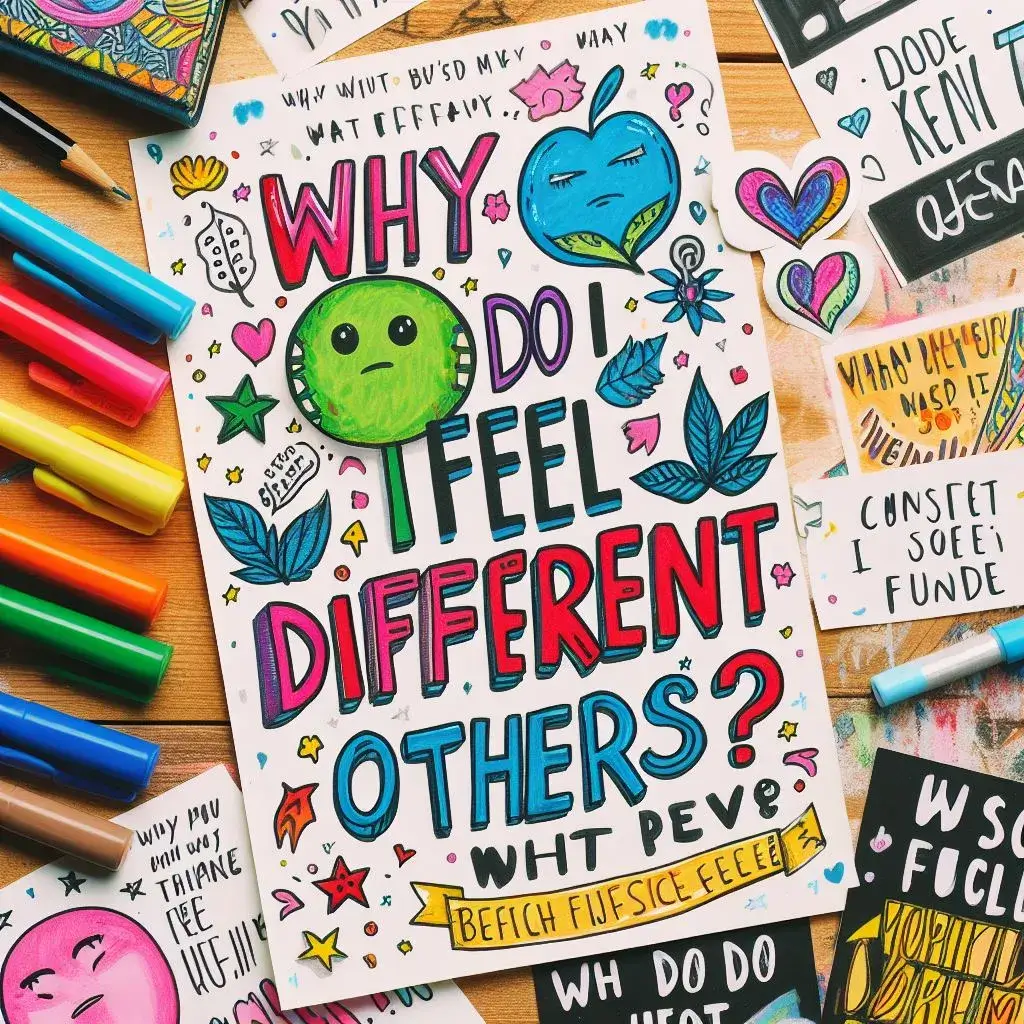Ever wondered why you feel like you don’t quite fit in? It’s okay, really. Feeling different is more common than you think. It’s like having your own special flavor in a world of vanilla. So, what makes you stand out?
Think about your life story, the stuff that’s happened to you, your background, and the things that make you, well, you. These bits and bobs shape who you are. But sometimes, they can make you feel a bit disconnected, like you’re on a different wavelength from everyone else.
So, In this piece of knowledge, we’ll find why you’re vibin’ differently and what moves you can make about it.
Why Do I Feel Different From Others? 3 Common Reasons
Different Upbringings and Backgrounds

One reason why you might feel different from others is because of your upbringing and background. This is because our upbringing and background shape our values, beliefs, and perspectives, which can make it difficult to relate to others who have had different life experiences.
Research has shown that individuals from different cultural backgrounds may have different values, communication styles, and social norms, which can lead to feelings of misunderstanding and disconnection (Sue & Sue, 2015). For example, someone who grew up in a collectivist culture may prioritize group harmony and interdependence, while someone from an individualistic culture may prioritize personal freedom and independence.
Similarly, individuals from different socio-economic backgrounds may have different levels of access to resources and opportunities, which can impact their life experiences and perspectives.
For example, someone who grew up in a low-income household may have a different perspective on money and financial stability than someone who grew up in a high-income household.
Not fitting social norms or stereotypes
Not fitting social norms or stereotypes can also contribute to feelings of difference and isolation. Social norms are the unwritten rules and expectations that govern behavior within a particular group or society. When we don’t fit these norms, it can make us feel like we don’t belong or that we are being judged by others.
The only way to deal with an unfree world is to become so absolutely free that your very existence is an act of rebellion.
Research has shown that individuals who don’t conform to social norms or stereotypes may experience social exclusion, discrimination, and prejudice (Abrams, Hogg, & Marques, 2005). This can be especially true for individuals who belong to marginalized or underrepresented groups.
For example, someone who is LGBTQ+ may feel like they don’t fit traditional gender norms or stereotypes, which can lead to feelings of difference and isolation.
Similarly, individuals who have nonconforming appearance or behavior may also feel like they don’t fit in. For example, someone with a physical disability may feel like they don’t fit societal norms of physical ability and attractiveness. This can lead to feelings of self-consciousness and low self-esteem, as well as feelings of difference and isolation.
Different Interests and Hobbies
Having different interests and hobbies can also contribute to feelings of difference and isolation. While it’s natural to have unique interests and passions, it can be difficult to connect with others who don’t share these same interests. This can lead to feelings of loneliness, especially if you don’t have anyone to share your hobbies with.
Research (McPherson, Smith-Lovin, & Brashears, 2006) has shown that shared interests and hobbies can play a major role in forming social connections and building relationships . When we have shared experiences and interests with others, it can create a sense of belonging and connection that can be difficult to find elsewhere.
However, when we don’t have shared interests with those around us, it can feel like there’s a barrier preventing us from connecting on a deeper level. This can be especially true if our interests are uncommon or not well-understood by others.
For example, someone who is passionate about a niche hobby, such as birdwatching or collecting rare coins, may struggle to find others who share this same interest. This can lead to feelings of isolation and disconnection, as they may not have anyone to share their experiences with.
Riding the Wave: Solutions When You Feel Different From Others

Connect with your identity through journaling
Journaling can be a helpful way to connect with your identity and understand your feelings of difference. Research has shown that journaling can be an effective coping mechanism for dealing with stress, anxiety, and feelings of isolation (Pennebaker & Beall, 1986). By writing about your experiences and emotions, you can gain insights into your thoughts and feelings, which can help you feel more grounded and centered.
Here are some tips for using journaling to connect with your identity:
- Reflect on your experiences: Take some time to reflect on your experiences and what makes you feel different. Write about the situations that have made you feel isolated or disconnected from others.
- Identify your values: Think about what is most important to you and why. Write about your values and how they shape your identity.
- Explore your emotions: Write about your emotions and try to identify patterns or themes. This can help you better understand why you feel the way you do and what you can do to cope.
- Practice self-compassion: Be kind to yourself and practice self-compassion. Write about your strengths and accomplishments, and remind yourself that it’s okay to feel different.
Change the Mindset
Changing your mindset can be an effective way to cope with feeling different from others. When you feel like an outsider, it’s easy to fall into negative thought patterns and beliefs about yourself and others. However, by changing your mindset, you can shift your perspective and find new ways to connect with others. Also check Why Mindset is Everything!
“Be who you are and say what you feel, because those who mind don’t matter and those who matter don’t mind.”
Here are some tips for changing your mindset:
- Practice gratitude: Focusing on the things you are grateful for can help shift your perspective and increase feelings of positivity and connection.
- Challenge negative thoughts: When you notice negative thoughts or beliefs about yourself or others, take a moment to challenge them. Ask yourself if they are based in reality or if they are simply your own biases.
- Focus on commonalities: Instead of focusing on differences, try to find commonalities with others. This can help you feel more connected and less isolated.
- Practice self-compassion: Be kind and compassionate towards yourself, especially when you are feeling different or alone. Remember that everyone feels this way at times and that it’s okay to ask for help.
- Seek out positive role models: Look for people who embody the qualities you admire and seek to learn from them. This can help you shift your mindset and find new sources of inspiration.
Try New Activities
Trying new activities can be an effective way to cope with feelings of difference and isolation. Engaging in new experiences can help you meet new people, learn new skills, and gain a sense of accomplishment. Research has shown that trying new activities can also have positive effects on well-being.
One study found that engaging in new activities can increase feelings of self-efficacy and self-esteem (Zhou & Huang, 2018). Participants who tried new activities reported feeling more confident and capable, which in turn improved their overall well-being.
Another study found that trying new activities can help reduce symptoms of depression and anxiety (Kim & Park, 2017). Participants who engaged in new activities reported feeling more connected to others and less isolated, which helped them feel happier and more fulfilled.
Here are some tips for trying new activities:
- Look for opportunities to try new things: Check out local community centers, clubs, or online forums to find new activities to try.
- Start small: Trying something new can be intimidating, so start small. Look for activities that are low-pressure and low-commitment.
- Be open-minded: Don’t be afraid to try something new, even if it’s outside of your comfort zone. You never know what you might enjoy.
- Bring a friend: Trying new activities with a friend can be a fun and supportive way to explore new experiences.
Be open but also set boundaries
Being open to new experiences and people can help you feel more connected and less isolated. However, it’s also important to set boundaries to protect your emotional well-being. Setting boundaries can help you establish healthy relationships and maintain a sense of self.
Fitting in is a short-term strategy, standing out pays off in the long term.”
When you feel different from others, it can be tempting to try to fit in by compromising your values or neglecting your own needs. However, this can lead to feelings of resentment and burnout. By setting boundaries, you can ensure that you are taking care of yourself while still being open to new experiences and people.
Research has shown that setting boundaries can have positive effects on mental health and well-being. One study found that individuals who were able to assert their boundaries reported higher levels of self-esteem and lower levels of stress and anxiety (Riggs, Gelfand, & Nishii, 2009). Another study found that setting boundaries can improve communication and reduce conflict in relationships (Sillars, Roberts, Leonard, & Dun, 2000).
Here are some tips for setting boundaries in a healthy way:
- Identify your needs and values: Take some time to reflect on what is important to you and what you need to feel happy and fulfilled.
- Communicate your boundaries clearly: Be clear and direct when communicating your boundaries to others. Use “I” statements to express your needs and feelings.
- Be assertive, but respectful: Stand up for yourself in a respectful and assertive way. Avoid being aggressive or passive-aggressive.
- Practice self-care: Make sure to prioritize your own needs and engage in self-care activities that help you feel relaxed and rejuvenated.
- Re-evaluate your boundaries as needed: Boundaries may need to be adjusted as circumstances change. Be open to re-evaluating your boundaries and making changes as necessary.



Lots of people use their lotteries to improve money for precious
initiatives that improve education, general public infrastructure and public services.
When the lottery is played by you, you’re helping to fund these programs when you finance your own desires of succeeding it big.
Have fun and good luck!
Thank you for sharing your thoughts!